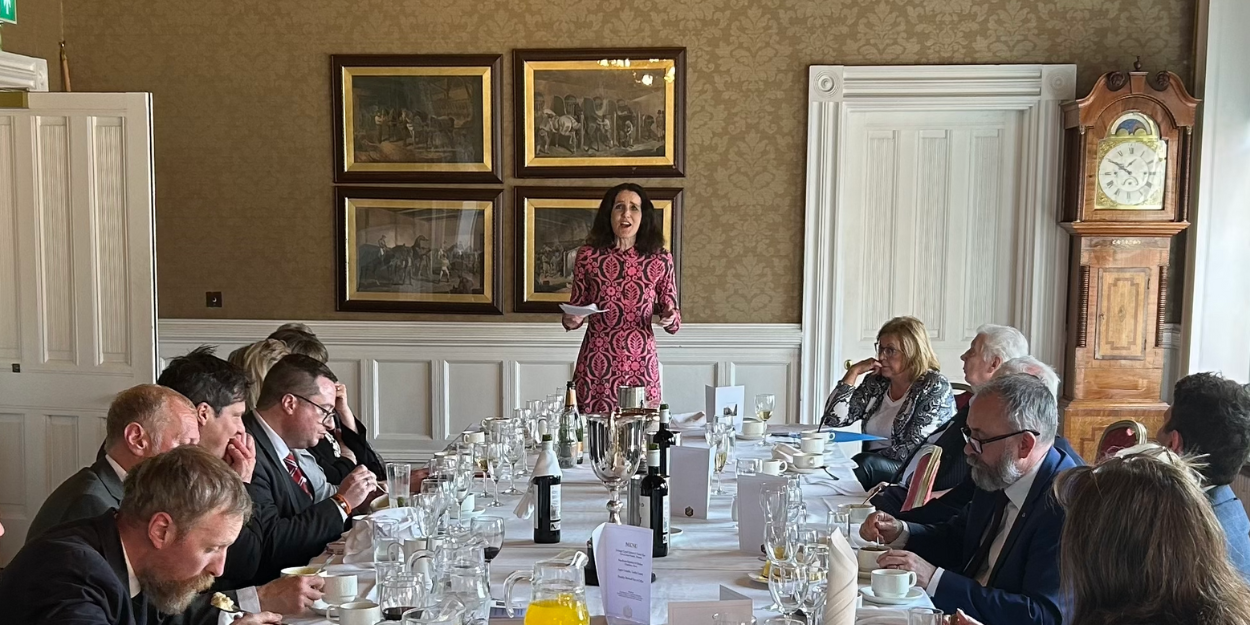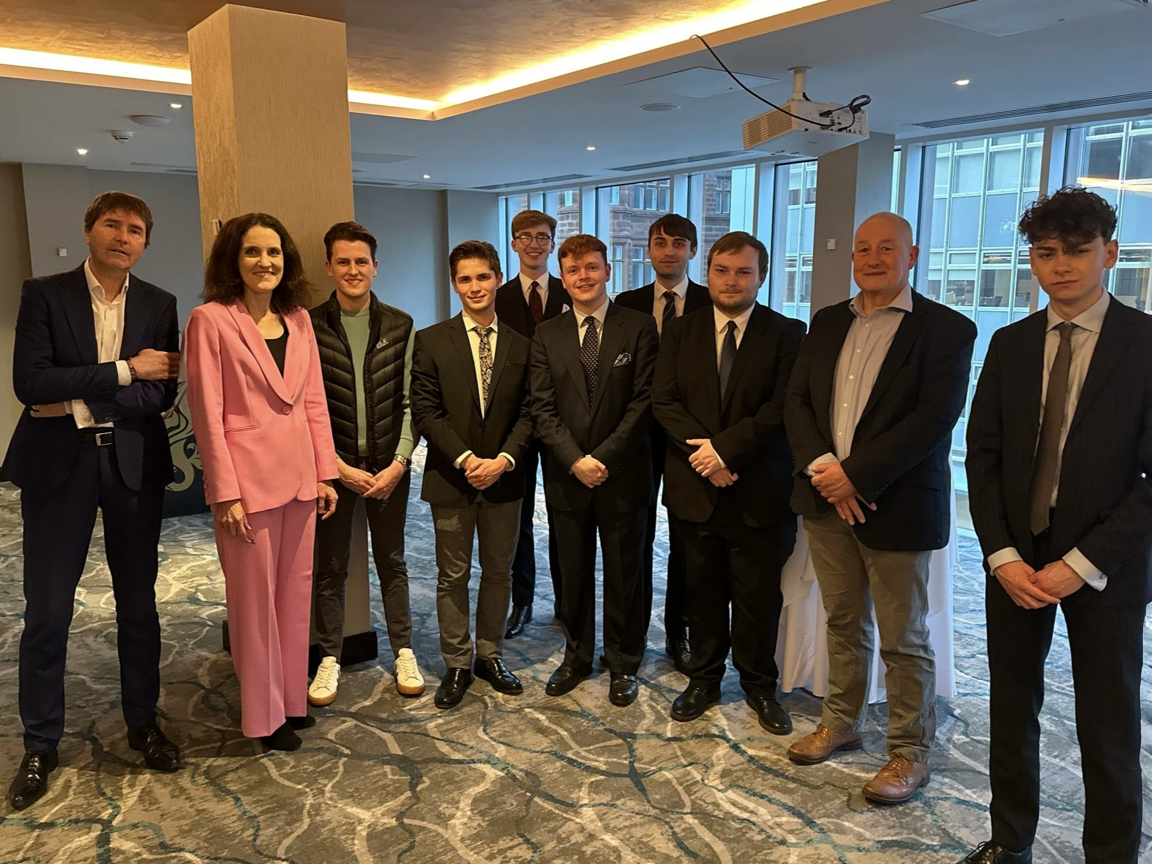
Former SOS Theresa Villiers’ Pro-Union Case for Northern Ireland
This speech by former Secretary of State for Northern Ireland Theresa Villiers was given in Belfast on 4th April 2025 at a business event hosted by Together UK, with the aim of promoting democratic engagement.
Theresa Villiers: Making a fresh and optimistic case for Northern Ireland staying in the UK family of nations
‘It is great to see business leaders coming together who share an ambition to see society progress through engagement, trade, and active participation in democracy.
Today I want to reflect on how we might reframe the debate on the Union; so we give greater emphasis to the positive case for staying, and focus less on negative arguments. And I really welcome Together UK’s contribution to that important task.
I appreciate that views from London aren’t always seen as helpful. But I hope the nearly four years I spent as Secretary of State has given me sufficient understanding of Northern Ireland to make it worthwhile for me to offer some thoughts on this.
I want to be clear that I do not see that a referendum is likely to happen any time soon and it is also clear that the preconditions set out in the Belfast Good Friday Agreement, which require such a poll, are not met. But we need to make a case for the Union on a continuous basis, to maintain the strong public support there currently is for it.
As we all know, political debates in general, and referendums in particular, tend often to focus on negative issues. I have the highest regard for Northern Ireland’s elected leaders, but I have to say they are not always very cheerful in their outlook.
In emphasising positive themes, I do not wish to give the impression that I’m naïve about the real problems people face here: with the economy, with poverty, with public services, with NHS delays etc.
But the presence of these very real challenges should not mean there is no space for starting a different kind of discourse on the Union – a fresh approach to help us persuade those who are undecided or open-minded, help us persuade young people, help us persuade minority communities who may not identify with either of Northern Ireland’s two longstanding cultural traditions.
If there were to be a border poll, these swing voters would be crucial. To win we will need to persuade these groups that Northern Ireland is a success: that it is a great place to live; a great place to bring up a family; a great place to do business.
Let’s take the last point. I appreciate that this is a tough time for businesses right across the UK, with the increase in Employer National Insurance, and the uncertainty caused by incoming US tariffs. I also accept that whilst the Windsor Framework may have mitigated the problems caused by the EU Protocol, frictions and costs remain.
But the economic benefits Northern Ireland has to offer to inward investors are immense. These include competitive costs; a highly educated and skilled workforce, particularly in areas such as fintech, cyber security and advanced manufacturing where NI is truly world leading; successful universities with a strong focus on research and skills needed by businesses; a stable and trusted legal system; taxes which, while higher than we would like, are still competitive compared to many jurisdictions.
And of course a key attraction for overseas companies is the quality of life which Northern Ireland can offer their workers.
Its housing is considerably more affordable than much of the rest of the UK, with access to the property ladder a viable prospect for a far greater proportion of the population. NI’s great schools deliver excellent results year after year. The country is home to some of the most beautiful landscapes in the world.
It has a rich cultural heritage from C S Lewis and Seamus Heaney to Van Morrison and Two Door Cinema Club. Its arts, music and culture scene is flourishing, with great galleries, museums and theatres. Its success in the film and TV industry has enabled millions of people around the world to glimpse its iconic scenery, not least through the world’s most successful television series, “Game of Thrones”.
Northern Ireland is most definitely not a cultural or economic backwater. It has so much to offer.
And for all its challenges, the NHS as one of the UK’s greatest assets. I fully appreciate the frustration felt about waiting times, but the security of knowing that the NHS is there for you, free at the point of need, is something few countries can equal. In the event of a united Ireland, it’s hard to see how people Northern Ireland would escape the charges which routinely apply to health care south of the border.
And while the Republic of Ireland has enjoyed real economic success over recent years, it also experienced the deeply painful Eurozone crash. It is not immune from vicissitudes of the global economic cycle. Significant numbers of families there experience hardship and cost of living problems. Housing affordability is clearly a very big issue. Put simply, there’s no economic nirvana in the south.
But perhaps the most important argument to win concerns community and society in Northern Ireland. Sadly there are still sectarian divisions, but a core part of the positive case for the union is to remind people of how far Northern Ireland has come.
The achievement of a durable and lasting settlement that has enabled people who were once deadly enemies to co-exist and work peacefully together for the good of the whole community is a genuinely inspirational story. It is a beacon for divided places around the world, giving them hope that they too can aspire to a better future, that workable compromises can be found, even where there are deeply entrenched views on different sides.
The fact that the devolved institutions have been out of action for much of the past few years has of course caused understandable exasperation. But we have seen a continued determination by elected leaders to find a way back.
And it is a sign that the foundations of these institutions are becoming more firmly rooted that not only is the Executive up and running again, but the election of a Sinn Fein First Minister has passed off without triggering major controversy.
The Belfast Agreement is a success. It has created a political system which, for all its stops and starts, genuinely works, despite political divisions which date back centuries.
The question to put to undecided voters is why throw that all up in the air? When stability was so hard won, why vote for constitutional upheaval with all the uncertainty we know that involves? The endless rows, the entry negotiations with Dublin, the exit negotiations with London, the crunch votes, the absorption of the whole political system on this issue to the exclusion of everything else, probably for years and years and years.
We need to convince people to stick with what works and celebrate what has been achieved, rather than take a gamble on a united Ireland and the abolition of Northern Ireland that that would involve.
No one can deny that there have been many painful episodes in the history of the relationship between Britain and Ireland, but our 21st century United Kingdom is a modern, inclusive, compassionate democracy which cherishes all its different nations, traditions and identities.
It is a truly successful political partnership, one which gives Northern Ireland the freedom to make its own decisions within the most wide-ranging devolution settlement in the country. But at the same time ensures the weight of the UK economy as a whole is there to act as a safety net when the global headwinds hit, as they did with the banking crash, Covid, and the Ukraine war energy price shock.
In conclusion, support for Northern Ireland’s place in the union continues to be strong, but referendum outcomes can be swayed in a way no one expects, and for reasons no one anticipated. So it’s more important than ever before that we put the case for UK unity in a way which is modern, appealing, and optimistic.’

Theresa Villiers, former Secretary of State for Northern Ireland (2012-2016)

